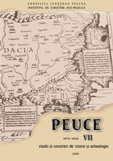Rome and Tarentum in Apulia, 326-320 B.C.
Rome and Tarentum in Apulia, 326-320 B.C.
Author(s): Decebal NeduSubject(s): Archaeology
Published by: Institutul de Cercetari Eco-Muzeale Tulcea - Institutul de Istorie si Arheologie
Keywords: pulia; Caudium; Lucanian League; Luceria; Rome; Samnite League; Tarentum
Summary/Abstract: Apulia represented the second important front of strategy in the Second Samnite War. Livy records that in 326 B.C. Rome signed an alliance with the Apulians. In modern historiography, many authoritative voices disputed the historicity of this treaty, motivating that it had been invented in order to justify the Roman armies’ disastrous defeat at Caudium, in 321 B.C. According to Livy, the armies trapped in the defile at Caudium were marching to Luceria, under siege by the Samnites. But the re-enactment proves only that the annalistic tradition used the Roman presence in Apulia to justify the Caudine defeat and not the lack of Rome’s contacts in Apulia. The alliance signed in 326 B.C. with several Apulian communities had obviously in view the possibility of using the Samnite forces in southeastern Italy, by opening a second field of military actions. At the same time, we cannot ignore another side of the agreement: the Apulian alliances were supposed to keep Tarentum at distance from the Samnite conflict and the centers in Apulia represented a base for possible military actions to southern Italy. After the Caudine peace, the Roman-Samnite hostilities ended, but Rome continued to consolidate its presence in Apulia. The literay tradition records military actions in this region and the conclusion of several treaties with Arpi, Teanum and Canusium between 320-318 B.C. In 320 B.C., when the Roman troops were ready to begin the battle with the Samnites at Luceria, Livy records the arrival of a mission from Tarentum, who tried to end the hostilities. There are not many doubts regarding the fact that the hostilities with the Samnites stopped until 315 B.C. due to the Caudine peace from 321 B.C. and the battle from Luceria is only an invention of the Roman historians. The situation is indeed unlikely, but behind it, it is possible to find Tarentum’s diplomatic intervention, worried about the expansion of the Roman influence in Apulia.
Journal: Peuce (Serie Nouă) - Studii şi cercetari de istorie şi arheologie
- Issue Year: VII/2009
- Issue No: 7
- Page Range: 63-72
- Page Count: 10
- Language: English

